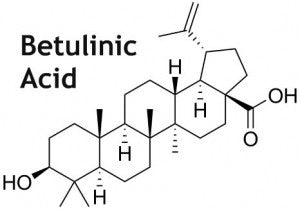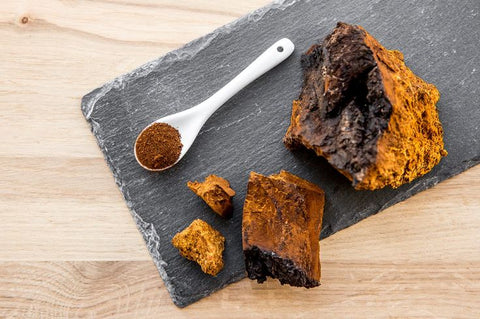A Tapestry of Ancient Wisdom and Modern Exploration
Chaga mushrooms, scientifically known as Inonotus obliquus, have captivated minds for centuries. These fascinating fungi, growing on birch trees in Siberia, Canada, and other frigid regions, have been woven into the fabric of traditional medicine, and their potential for long term modern medical breakthroughs is now starting to be unravelled.
Delving into Chaga's Symphony of Bioactive Compounds
At the heart of Chaga's allure lies a complex symphony of bioactive compounds that fall under the category of adaptogenis, each playing a distinct role in its potential health benefits:
Beta D Glucans
They act as messengers, stimulating the body's immune system to mount a powerful response against infections. They do this by activating various immune cells, such as macrophages and natural killer cells, which help to identify and destroy pathogens. Additionally, Beta D Glucans can increase the production of cytokines, which are signalling molecules that regulate the immune response.
Triterpenes
This diverse group of organic compounds, including the prominent betulinic acid, plays a vital role in Chaga's multifaceted approach to health. Triterpenes exhibit a range of properties, including:
Anti-inflammatory effects: Triterpenes can help to reduce inflammation by inhibiting the production of inflammatory mediators like prostaglandins and cytokines. This may be beneficial in managing conditions like arthritis, chronic inflammation, inflammatory bowel disease, and asthma.
Antioxidant properties: Triterpenes can act as antioxidants, scavenging free radicals in the body that can damage cells and contribute to various chronic diseases.
Potential antitumor properties: Some studies suggest that triterpenes may have antitumor properties by inhibiting the growth and proliferation of cancer cells.
Betulinic Acid
This pentacyclic triterpenoid, derived from birch trees and refined within Chaga, takes center stage. Not only does it showcase antitumor potential, but it also holds the key to one of Chaga's most intriguing discoveries: its ability to inhibit HIV-2. While the exact mechanisms are still being investigated, studies suggest that betulinic acid may interfere with the HIV-2 virus's ability to enter and replicate within host cells. [1]
Chaga and The Birch Tree Connection: The Origins of Betulinic Acid
Chaga's unique story begins with a symbiotic dance with birch trees. As an adaptogen, Chaga engulfs the tree, draws sustenance, and absorbs birch-derived betulinic acid. This intricate relationship not only provides Chaga with essential nutrients but also equips it with unique bioactive compounds like betulinic acid, which contribute to its potential medicinal properties.

Chaga's Legacy of Healing: From Ancient Practices to Culinary Delights
For centuries, Chaga has been revered as a potent healer in traditional medicine. Indigenous Siberians, recognizing its potential, ingeniously incorporated Chaga into their daily lives. Used as a powder and steeped into teas (great with herbal tea), and even added to stews, Chaga became a cornerstone of their healthcare practices. Interestingly, historical records suggest lower cancer rates among Siberians, potentially hinting at the tangible results of this ancient wisdom.

A Glimpse into the Future of Mushrooms: Chaga and its Potential Role in HIV Treatment
Amidst Chaga's compelling history, a scientific revelation emerges, adding a new dimension to its potential benefits. Studies focusing on derivatives of betulinic acid and their effectiveness against HIV-2 unveil a promising chapter. Research shows that modified forms of betulinic acid found in Chaga demonstrate the potential to inhibit the virus, suggesting possibilities for new HIV-2 treatment options.
However, it is crucial to emphasise that further research is necessary to explore and validate these findings fully. Additionally, it is important to note that Chaga should not be considered a substitute for conventional HIV treatment, and anyone considering its use should consult with their healthcare provider first to discuss the potential risks and benefits in the context of their individual situation.
Beyond HIV-2 Inhibition: Exploring Chaga's Multifaceted Potential
Chaga's story extends beyond its potential role in HIV-2 inhibition, revealing a spectrum of health benefits.
The interplay between betulinic acid and other bioactive compounds in Chaga contributes to its potential antiretroviral and anti-inflammatory effects.
Antiretroviral and Anti-inflammatory Actions
The interplay between betulinic acid and other bioactive compounds in Chaga contributes to its potential antiretroviral and anti-inflammatory effects. These properties may be beneficial in managing various conditions, but further research is needed to understand the specific mechanisms and efficacy.
Antiretroviral effects: While studies have shown that betulinic acid can inhibit HIV-2, it is important to understand that this finding applies specifically to HIV-2 and not HIV-1, the more common strain of the virus. Additionally, the research on Chaga's antiretroviral effects is still in its early stages, and more studies are needed to determine its effectiveness.
Anti-inflammatory effects: Chaga's anti-inflammatory properties may be attributed to its triterpene content, including betulinic acid and others. These compounds may help to reduce inflammation by inhibiting the production of inflammatory mediators like cytokines and prostaglandins as well as manage blood sugar levels.
Chaga's richness in betulinic acid contributes significantly to its potent antioxidant properties. Antioxidants counteract the harmful effects of free radicals in the body, potentially promoting cellular health and protecting against oxidative stress, which is linked to various chronic diseases. [2, 3]
Free radicals: These are unstable molecules with an unpaired electron, making them highly reactive and capable of damaging healthy cells and contributing to various chronic conditions like heart disease, cancer, and neurodegenerative diseases.
By scavenging free radicals, Chaga may help to protect cells from damage and potentially lower the risk of chronic diseases associated with oxidative stress. However, further research is needed to determine the specific mechanisms and clinical relevance of Chaga's antioxidant properties in humans. [4]
A Vision for the Future: The Chaga Legacy
As we navigate Chaga's legacy, from its birch tree origins to its potential breakthroughs in HIV-2 inhibition, Chaga invites us not only to explore its roots but to envision a future where traditional remedies and scientific discoveries coalesce for the betterment of human health.
The journey continues, and the Chaga mushroom stands as a timeless witness to the interplay of tradition and progress, inviting us to discover more about its multifaceted tapestry. However, it is crucial to remember that more research is necessary to fully understand the safety and efficacy of Chaga for various health conditions.
References
1. Betulinic acid derivatives as Human Immunodeficiency Virus type 2 (HIV-2) inhibitors. Dang Z, Lai W, Qian K, Ho P, Lee KH, Chen CH, Huang L. J Med Chem. 2009;52(23):7887–7891.
2. Van, Q., Nayak, B.N., Reimer, M., Jones, P.J.H., Fulcher, R.G., Rempel, C.B. 2009, ‘Anti-inflammatory effect of Inonotus obliquus, Polygala senega L., and Viburnum trilobum in a cell screening assay’, Journal of Ethnopharmacology, vol. 125, no. 3, pp. 487-493. https://doi.org/10.1016/j.jep.2009.06.026
3. Park, Y.M., Won, J.H., Kim, Y.H., Choi, J.W., Park, H.J., Lee, K.T. 2005, ‘In vivo and in vitro anti-inflammatory and anti-nociceptive effects of the methanol extract of Inonotus obliquus’, Journal of Ethnopharmacology, vol. 101, no. 1-3, pp. 120-8. https://doi.org/10.1016/j.jep.2005.04.003
4. Park, Y.K., Lee, H.B., Jeon, E.J., Jung, H.S., Kang, M.H. 2008, ‘Chaga mushroom extract inhibits oxidative DNA damage in human lymphocytes as assessed by comet assay’, BioFactors, vol. 21, no. 1-4, pp. 109-112. https://doi.org/10.1002/biof.552210120
Disclaimer: Remember while the potential benefits of mushrooms are compelling, consulting your healthcare professional before incorporating them into your routine is paramount, especially if you have underlying health conditions or take medications.

